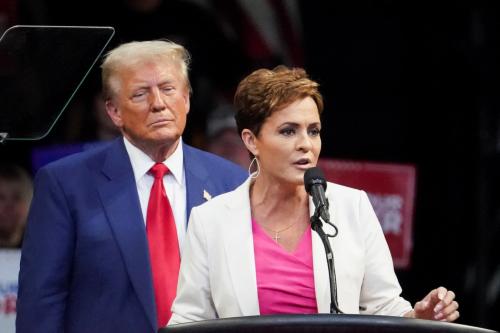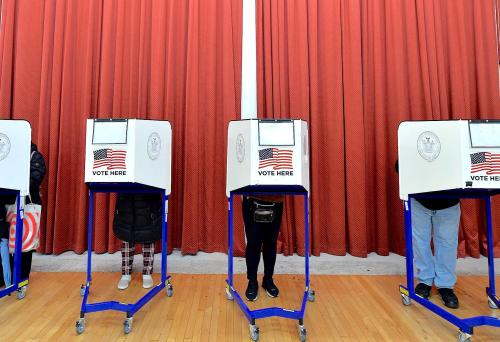All eyes were on Hillary Rodham Clinton as she entered the Senate one year ago. It was hard to miss her, the only freshman senator trailed by a pack of reporters wherever she went. But pundits who predicted that Clinton would be ideologically combative and a lightning rod for conservative critics were mistaken.
To be sure, the year started on a difficult note, with both Sen. Clinton and Bill Clinton embroiled in scandals over the taking of White House gifts and the former president’s last-hour pardons. The ethical and political instincts of the Clintons were once again called into question, raising alarms about the coming six years for Hillary Clinton.
Nor did the Senate greet Clinton with open arms, refusing to give her the seats she sought on the most prestigious committees. Instead, she was relegated to second-tier policy committees, including health and education, environment and budget panels.
Despite the inauspicious beginning, Clinton should earn high marks from New Yorkers for her first-year performance, no matter what one thinks of her ideological stripes. Rather than becoming a Senate show horse, Clinton emerged as a Senate workhorse for the State of New York. Although her name recognition among Americans—indeed, worldwide—remains astronomically high, relatively few outside New York probably have caught much sight of her in the news this past year.
What has Clinton been doing out of the national limelight? To her credit, she has taken up the serious business of attending to the interests of New Yorkers, even before the horrific events of Sept. 11. Her legislative agenda has focused on education, health care and the environment, working even across party lines on occasion on issues she considers important to the residents of New York.
Her performance after the terrorist attacks on New York and Washington also showed her single-minded focus on New York, as she attended to the health and welfare of rescue workers and the financial needs of New York City. She has been all but absent from the national stage, declining to enter the partisan fray over issues such as the appropriate way to stimulate the economy.
Why the retreat from the national stage? Clinton’s submersion into the issues of New Yorkers makes good sense on a number of fronts. First, it is smart electoral politics for Clinton to begin straight off by building a record of attention to local and regional issues of import to New York. Although freshman senators often focus on building their state reputations, Clinton more than most senators needs to prove to skeptical constituents that she truly cares about the interests of her adopted home state. Developing the trust of diverse constituencies will give her leeway later to pursue more ideologically charged issues of national concern. And such trust will be essential when and if she runs for re-election in 2006. Senators today rarely wait until their sixth year to begin campaigns, so Clinton’s early attention to New Yorkers makes sound electoral sense.
Second, Clinton has much to gain from her Senate peers by building a reputation as a dogged advocate for New York. Learning the ropes of the Senate—while leaving the national limelight to her equally ambitious colleagues—will help to foster the goodwill of her fellow senators. Although it may be harder to win over her conservative antagonists, earning institutional respect is essential if Clinton hopes to emerge as an effective policy maker for New York. Getting things done in the Senate quite often takes a personal touch, as senators seek to avoid procedural traps set by colleagues. Keeping a low profile during her early Senate years and proving herself to be a workhorse of the chamber will be critical to Clinton’s future political success.
Clinton’s tactics are not, however, cost-free. Democrats were excited about Clinton’s candidacy in 2000 because they expected her to take the national stage promptly as a forceful advocate for the Democrats’ domestic agenda. By taking a back seat in the Democratic ranks, Clinton has given President George W. Bush more room on the domestic stage, affording him a freer hand to set the nation’s agenda. To be sure, the events of Sept. 11 put the Democrats’ domestic priorities on the back burner this past fall. But we’re now in an election year, and pollsters are finding that health care and the economy top voters’ concerns. Democrats will want to define their differences with Republicans, and they will need articulate advocates to speak up for their agenda. It is doubtful that Clinton can both step onto the national stage and still doggedly pursue the interests of New York.
In many ways, Clinton is just like most other new senators, working hard to establish her reputation at home before tackling a more ambitious political agenda in Washington. Of course, Clinton will always be unique among her Senate classmates, given her fund-raising prowess and international repute. Indeed, while doing the typical work of a Senate freshman, Clinton has also continued to raise enormous sums of money, taking in nearly a million dollars in 2001 for her political action committee. Almost one-third of those funds have been given to candidates running in 2002, including several Democratic colleagues running for re-election.
Building bridges to prominent Senate colleagues—as well as bridges around New York—suggests that Clinton still harbors political ambitions for her Senate future and perhaps beyond. Managing to end her first year without further controversy was a necessary first step for pursuing those bigger goals.
The Brookings Institution is committed to quality, independence, and impact.
We are supported by a diverse array of funders. In line with our values and policies, each Brookings publication represents the sole views of its author(s).



Commentary
Op-edHillary’s Workhorse Image Serves Her Well
January 29, 2002